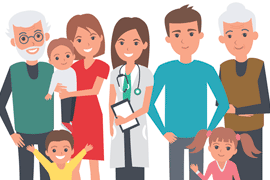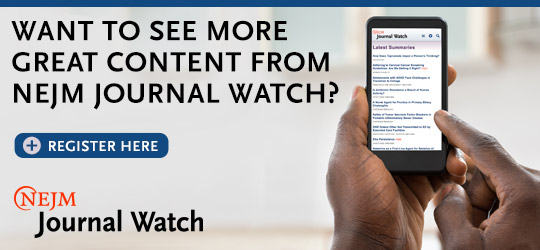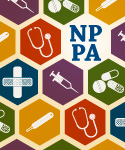June 9th, 2017
How Giving Friends and Family Medical Advice Made Me Sick
Emily F. Moore, RN, MSN, CPNP-PC, CCRN

Emily F. Moore, RN, MSN, CPNP-PC, CCRN practices pediatric cardiovascular care across the Pacific Northwest.
The other night, my sister called me asking if she should take my niece to the emergency department. She had been complaining of abdominal pain with on-and-off vomiting and diarrhea for a couple days. According to my sister, she had gotten to the point where the pain was unbearable. I quickly ran through my niece’s symptoms, asked a few questions, and developed a differential of what I thought it might be. I was quite certain she had an appendicitis, but thought perhaps I was overreacting given that this was my niece, not my average patient. Come to find out, she not only had an appendicitis, but her appendix had ruptured and she was quite ill.
Since I graduated from nursing school, it is not uncommon for my family or friends to call seeking medical advice. Initially, I didn’t think anything of it. I was flattered that my (large) family trusted me with their queries. However, as my practice began to focus more and more on pediatric cardiac surgery and less on pediatric primary care, I began to recognize how much I did not know regarding noncardiac body systems.
 This left me not only constantly questioning the advice I had given, but also worrying about the legalities related to the situation. Granted, I was not actually prescribing for or treating my family, but they were querying me frequently over fevers, rashes, ear pain, stomachaches and the like. With each query, I would second-guess myself and perseverate over advice given. What if I had dismissed that rash as contact dermatitis and it was actually infectious, an allergic sensitivity, or something more bizarre? I couldn’t help but think that if the advice I’d given over the phone was wrong, I would land in court defending myself. This was an irrational fear, as I didn’t actually think that my family or friends would sue me. Nonetheless, it caused me a great deal of stress.
This left me not only constantly questioning the advice I had given, but also worrying about the legalities related to the situation. Granted, I was not actually prescribing for or treating my family, but they were querying me frequently over fevers, rashes, ear pain, stomachaches and the like. With each query, I would second-guess myself and perseverate over advice given. What if I had dismissed that rash as contact dermatitis and it was actually infectious, an allergic sensitivity, or something more bizarre? I couldn’t help but think that if the advice I’d given over the phone was wrong, I would land in court defending myself. This was an irrational fear, as I didn’t actually think that my family or friends would sue me. Nonetheless, it caused me a great deal of stress.
Another unpleasant side effect of trying to help was the pushback I received. The level of questioning I got in response to my advice was almost insulting at times. In my head, I told these callers, “If you trusted me enough to call me with your ailment, why aren’t you trusting my opinion?” “If Dr. Google says otherwise and you already researched this, don’t ask me.” “If you generally want my opinion, I am happy to give it, but please, I can’t stress it enough, do not rebut me with the latest entry on Wikipedia.” Of course, I never I actually said any of this.
Things came to a head when I was surrounded by a lot of severe illness in my family. Naturally one to externalize my stress, I began to notice various physical symptoms and poor sleep setting in. I knew I didn’t need to see my primary care provider, but I wanted to address my stress level. So, taking advantage of my employer benefits, I consulted with a naturopath, who recognized my infirmities as anxiety over giving my family and friends the wrong medical advice. I love my family, and I certainly love helping. However, the thought of providing misleading advice was almost crippling. I found myself thinking and rethinking the most simple of complaints.
 After seeing my naturopath, I decided to cut the cord on providing medical advice to non-patients. My clinician gave me strict instructions to not respond to texts after 7 PM. As those hooked on communication devices (all of us, it seems?) can imagine, this was like having an itch I couldn’t scratch. The compulsion to check my phone haunted me. Nevertheless, I stuck to it, and I also made a plan to set firm boundaries with those calling with medical questions. I started telling people things like, “My specialty is pediatric cardiology and cardiac surgery. I am sorry your finger is swollen, but you’ll have to see your provider if it is bothering you” and “I can help change a dressing, but no, I will not buddy tape your toe and diagnose it as broken. For that, you need to see a provider.”
After seeing my naturopath, I decided to cut the cord on providing medical advice to non-patients. My clinician gave me strict instructions to not respond to texts after 7 PM. As those hooked on communication devices (all of us, it seems?) can imagine, this was like having an itch I couldn’t scratch. The compulsion to check my phone haunted me. Nevertheless, I stuck to it, and I also made a plan to set firm boundaries with those calling with medical questions. I started telling people things like, “My specialty is pediatric cardiology and cardiac surgery. I am sorry your finger is swollen, but you’ll have to see your provider if it is bothering you” and “I can help change a dressing, but no, I will not buddy tape your toe and diagnose it as broken. For that, you need to see a provider.”
Slowly but surely, the healthcare queries stopped. I do still get calls; the case of my niece is a perfect example. I would be upset had my sister not called in that situation. Overall though, the number of queries has lessened and, most importantly, I can sleep at night again.



Have done the same many times. Was in family practice, so I thought I was OK. As I have become much more experienced I tend not to. Many reasons. Drug use and concomitant medications no one tells you about. Real drug abuse they surely would not tell you about. YOUR ability to want them to be OK and not be as objective as you would be with a patient.
You don’t look at them as patients, but as whomever they are to you.
so it’s better to either say, “Come to my office” to get seen, or “I don’t have the objectivity to do this well as I want the best for you so let someone else see you”.
Dave
Dave,
Thank you for your response! I couldn’t agree more, one definitely struggles with objectivity when caring for family. I have found the more transparent regarding this the more its understood.
Emily
No one should try to DIAGNOSE abdominal pain, rashes, or fevers without seeing the patient.
I would handle the abdominal pain question, were I you, like this:
A good diagnostician will get a good history, often involves talking to the patient directly, then he will do an informed examination. Possibly some lab work will be done, if the diagnosis is still unclear, the diagnostician will wait a few hours and re- examine. Or refer.
If you cannot do all of the steps, then don’t render a definitive opinion. Why do you find this difficult? That your rely on a naturopath is disconcerting to me.
James,
I could not agree more! One must see the patient to diagnose such ailments. I have been practicing as a Nurse and APP for over 15 years now and have found, for me, strong boundaries come with time.
Emily
“I knew I didn’t need to see my primary care provider, but I wanted to address my stress level. So, taking advantage of my employer benefits, I consulted with a naturopath, who recognized my infirmities as anxiety.”
As a primary care physician, I’m disappointed that you didn’t connect with yours. Anxiety is one of the common acute complaints I see in primary care and I am comfortable recommmending behavioral treatments tailored to the needs to my patients — but I am more equipped to weigh the benefits of other additional treatment modalities than any naturopath.
I hope that when you give advice to others you are not steering them away from primary care and to naturopaths. Let primary care be primary! “Alternative providers” often do not meet the needs of patients, may recommend harmful treatments or delay patients from seeking true medical care, and interfere with PCPs’ relationships with our patients and ability to appropriately triage symptoms.
I am surprised that this column — on your ability to triage primary care complaints! — made it past your editor, and am disappointed.
Dear Reader,
Thank you for your comment. Please note — as stated on our website (see the bottom of this web page — blogs.jwatch.org) — that the views and opinions expressed in these blogs are not necessarily those of NEJM Journal Watch or NEJM Group.
Sincerely,
The NEJM Journal Watch Blog Editors
I have been put in this same position so many times, that I finally, like you, had to tell them to contact their provider or go to the ER/Urgent Care. I owned a small family practice clinic and some would actually show up there rather than going to their PCP or ER. I do understand how hard it is to tell them to go to their PCP’s, but I believe this is the correct action. We love our family and friends and do not want to see them ill or in pain, but we also want them to receive objective care.
Abdominal pain , even if treated in an ER , requires a CT scan in this litigious society if appendicitis or peritonitis is suspected. Surgeons , and I am a surgical PA, almost always demand a CT scan prior to them seeing the patient who may require surgery. In general, regardless of where you received your prompting, it was good advice. When you make a serious error with a family member, you are not only the black sheep but also are liable and some families think nothing of following with an attorney if the outcome is bad. When you do the same for people that are friends or live on the block, you are taking the same risk.
I had a PACU nurse ask me for an antibiotic prescription in the presence of my Chief of Surgery and he said to me that I was breaking the law as I did not have a chart or perform an examination. That was twenty years ago and some of the consequences we have today, to our knowledge, did not exist. You have made the correct decision.
Robert,
Thank you for your support!
Sounds as though your Chief Surgeon was wise to give you such advice.
Emily
Your specialty is pediatric cardiology and cardiac surgery? Really. When did you pass the pediatric cardiology boards? Where did you do your pediatric cardiology fellowship? Peds residency? Medical school? Pre-med bachelor’s degree?
What’s that? You didn’t complete any of those things? With all due respect, your specialty is not pediatric or surgical anything. You work with specialists in pediatric cardiology and cardiac surgery, and your claims make as much sense as a legal secretary claiming to specialize in corporate law. And to the editors if NEJM Watch: shame on you.
As someone with medical professionals in my family, I appreciate this perspective and think it’s valuable for friends and family to read. Thanks for your honest and thoughtful views.
This NEJM blog post set off all kinds of alarm bells as I was reading it, from “I was certain it was appendicitis from talking to her on the phone” to “I knew I didn’t need to see my primary care provider about my stress” to “I sought medical advice from a naturopath who acted as a quasi-therapist.”
I am very surprised that NEJM, one of the most respected journals in medical practice, would allow its brand to be associated with the very poor medical practices above.
I certainly hope that anyone reading this blog post would not take any of the actions undertaken by the RN, MSN, CPNP-PC, CCRN above to be sound medical advice.
Maybe I’m missing something here, but I think that giving advice as a medical professional to family members and friends over the phone is distinctly different from making a diagnosis and treating. I am a retired family doctor, and I give advice which I regard as similar to my personal reasoning if I myself or my husband/child/grandchild has a medical issue. Just as I would not treat myself or those people, my advice involves not what I think the problem is, but what level of care is needed at that time, i.e. ‘go to the ED’, ‘call your PCP in the am’; ‘use an OTC product and/or wait and see what happens’. Of course if this causes you anxiety, or if you do not feel competent to triage in this manner, then it is appropriate for you to decline giving this advice with whatever explanation seems appropriate to you.
Thanks for this post. I struggle with this issue as well, more from friends than family, and have really struggled with boundaries. I appreciate your perspective and may institute the ‘no phone after 7pm’ rule!